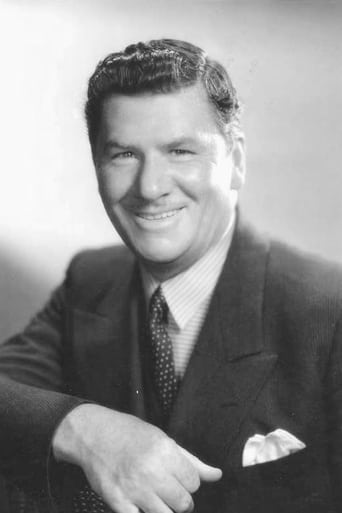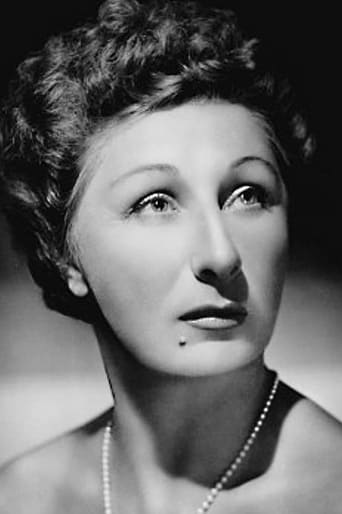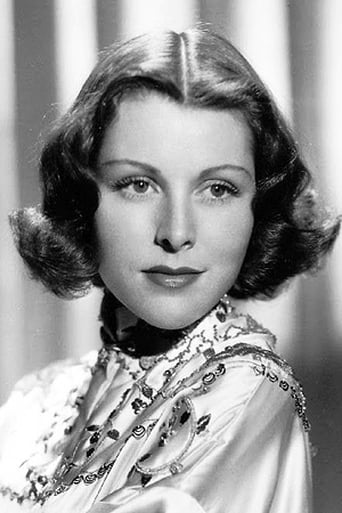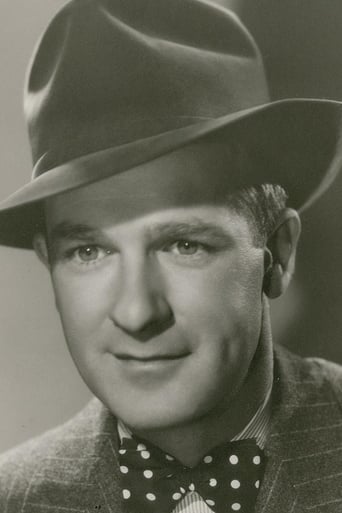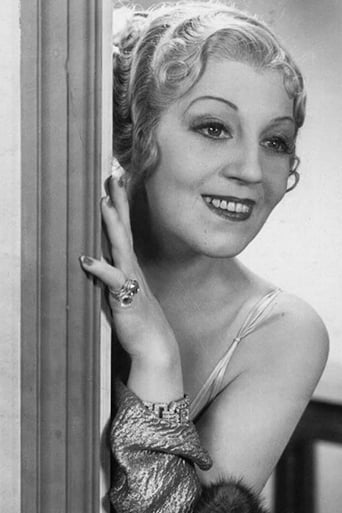CheerupSilver
Very Cool!!!
Voxitype
Good films always raise compelling questions, whether the format is fiction or documentary fact.
Mandeep Tyson
The acting in this movie is really good.
Rosie Searle
It's the kind of movie you'll want to see a second time with someone who hasn't seen it yet, to remember what it was like to watch it for the first time.
calvinnme
...who spent so much time over at RKO playing the sweet young thing. Dee plays the catalyst of the entire story, even though, sometimes, you won't even know what she is up to.The main character, however, is George Bancroft as Bill Bailey, a bail bondsman and PR man extraordinaire. It shows how well connected he is as just about every criminal in town has bail through Bailey. He knows the attorneys, the judges, and most of the underworld. He carries around cigars that say "Bailey For Bail" on them. It's mentioned later that he was once a cop that got thrown off the force for graft, and even though he's a gray character, he plays this like Popeye - "I am what I am", and you know something, I liked him. I liked him because he was on the level about who he was and what he did. He has a girlfriend (Judith Anderson as Ruby Darling) who seems to be a madam, maybe not, but for sure runs an upscale saloon complete with torch singers. And she, like Bailey, "is what she is". She does not pretend.And then a different kind of customer walks into his establishment - socialite Elaine Talbart (Frances Dee), arrested for shoplifting, and hands him a six thousand dollar ring as collateral for much smaller bail. She claims the whole thing is a big misunderstanding (it is not). At first Bailey is just intrigued because her family is so wealthy, but soon he is falling for the girl. However, Elaine's big downfall, and the downfall of everybody she encounters, is that she is a spoiled brat who is addicted to excitement and danger. And THAT is why she starts a relationship with Bailey. He shows her a side of life she has never seen before.One more thing, towards the beginning of the film Ruby's baby brother gets out of prison. Nope. There was no mistake. Her little brother Drury is a thief and probably will always be one. He doesn't like violence, he just likes money and isn't partial to hard work.And then one day at the races when Bailey is with Elaine, over walks good looking Drury, and when she finds out his past she gets a twinkle in her eye...a ticket to even more excitement! Boy, has she got that right because Drury is about to pull another bank job. When he skips town with Bailey's bail and with his girl, it starts warfare with Ruby and the underworld on one side and Bailey, who realigns himself with the police, on the other side. The thing that nobody knows is that the act of betrayal that starts it all is caused by a decision Elaine makes unilaterally. How does this all work out and what was that decision? Watch and find out. I'll just say that the end of this film was a blast.There are some great individual scenes in this one that are strictly precode - at Ruby's, Bailey offers a gentleman a cigar, "he" turns around and turns out to be a woman in a man's suit. She takes a puff of the cigar and says "you big sissy!". Bailey busts out laughing. A woman comes into Bailey's office with a boy about 15 and wants to put up his bail. She says "her boy is a good boy". Bailey asks what the charge is and she says "assault" - that was code for rape in even the precode era. Bailey asks how old the girl was, and the boy says 38. Bailey laughs at the thought - a thought that would not be funny today. Finally, a woman runs screaming out of a building claiming that a man advertised for artists' models, she showed up, and he attacked her. Elaine asks where is the artist? The woman points to an office, and Elaine grabs the ad and walks deliberately towards the office. Hot stuff from Fox, a studio not usually associated with precode stuff.
mark.waltz
Bail bondsman George Bancroft is known all throughout New York City and encounters people from every scrape of society in this pre-code crime drama. But he's going to need every ounce of street-smarts when he strikes up an acquaintance with kleptomaniac Frances Dee, a woman with a rather animistic sexual appetite. Judith Anderson gets to display a rare glamorous side here as the nightclub hostess obviously in love with Bancroft, with her famous mole darkened into a beauty spot. Dee gives Bancroft several looks that It's nice to see her playing a softer character. This is a fast-moving programmer, made on a dime, but not showing it. Quick edits, snappy photography and dialog, nice musical interludes by Blossom Seeley (singing such standards as "Melancholy Baby"), and a side of seedy New York sung about in the same year's "42nd Street" diluted in most movies. There's hints about lesbianism in addition to Dee's whacked-out libido. Tons of familiar character actors pop in and out, most notably Etienne Girardot, Chick Chandler (as Anderson's gangster brother), Clarence Wilson and Edward Van Sloan. There's even a very young Lucille Ball in a quick appearance! An exciting dog racing sequence is one of the film's visual highlights, and the finale is downright suspenseful, like something Hitchcock might do.
dougdoepke
What a wacky little gem from cult filmmaker Rowland Brown. He got this one in just under the wire. The next year 1934 would see an all-out effort to "clean up the movies", and for the next 30 years audiences would get twin beds, closed-mouth kissing, and no hint of a human vagary that couldn't be shoe-horned into Jack Webb- style law and order or Rock meets Doris type romance. None of that predictable conventionality here. Instead, it's an unapologetic look at a layer of urban life soon to be shoved back into the Legion of Decency's dark closet. Macho bail bondsman George Bancroft works the shady side of the law, dabbling at times in stolen property. Nothing too unusual there. But watch him caress thief Chick Chandler's shoulder even after the latter has moved in on Bancroft's girl, or laugh uproariously at a "sissy" remark thrown his way. He may end up with the bordello madam, but it looks like the law is not the only both-sides-of-the-street he works.Then there's sweet-faced ingénue Frances Dee as the rich girl on-the-make. But it's not Cary Grant or Ralph Bellamy she's hankering for. It's the load of masochistic pain that makes her eyes go all shiny and her voice all quavery. The problem is she can't decide whether it's the brawny thrills of a masterful man or the hip-swiveling charms of a hula girl that attracts her more. There's also the erotic sideline of lifting meaningless articles from downtown stores that sort of fills the day-to-day gaps, to say nothing of a sense of loyalty that sort of comes and goes. She may look like one of those madcap heiresses of the thirties, but the reality is far more Freudian and provocative.And what other movie would dare make a sympathetic sex object out of that hawk-nosed paradigm of female villainy Judith Anderson. Apparently, it was her first film before the gargoyle type-casting that would later take hold. Meanwhile, the slinky gowns and plunging neck-lines are surprisingly effective, even if the facial profile is not exactly that of the classic Hollywood beauty. It's a measure of Brown's humanity, I take it, that her character as a bordello madam comes across as the movie's most sympathetic.Mix these characters into what amounts to an urban inferno and you get a genuine piece of Hollywood exotica, to say nothing of the monocled cross-dresser who dates Chick Chandler's nervy thief, the same guy who hires on not one professional girl for the evening, but two (one of which is an early Lucille Ball). Note too, how easily the shady Bancroft mixes in with the respectable types. First it's an insurance executive, then a shipping magnate, and most conveniently, the city DA, as overworld and underworld blend into a single shape-shifting shade of gray. It's that margin of ambiguity, not only between the sexes, but between the social classes and the law that lies, I believe, at the movie's core. The fluid nature of things is made more apparent by the fact that Brown remains non-judgmental throughout. His characters simply are as they are. Dee is made no less deserving of happiness than anyone else. And in one of the strangest of all Hollywood endings, where Bancroft and Anderson at last find true love, Dee goes gleefully off to another expected masochistic romp, unpunished. Love and lust both triumph here, with no moral distinction drawn at fade-out. And when Bancroft is made to remark that liberals acknowledge human vice and try to control it, whereas conservatives simply turn their backs on its existence, that sounds like Brown speaking. Certainly, he was no conservative in that respect. Hollywood, however, would unfortunately turn their backs on selected reality for the next thirty years, as Brown's all-too-brief career underscores. Too bad. For as the movie shows in its own unorthodox way, his loss was our loss too.
MartinHafer
I called this film a "Pre-Code" film because up until the strengthened Production Code was enforced in 1934, Hollywood was a very sleazy place by even today's standards! While in the mid-30s through the 50s films were sanitized (in some cases, too much), in the Pre-Code days, topics like adultery and extreme violence were common and it was not too unusual to hear cursing, discussions of abortion or prostitution and even occasionally nudity--even in supposedly family films like TARZAN AND HIS MATE! While BLOOD MONEY isn't nearly as rough and family unfriendly as many of these films, it deserves to be considered a Pre-Code style film because the main character and his wife had an "open marriage"--he was allowed to sleep around as long as he "came home to her when the day was through". Also, the film features a bad woman who loves to break laws and have sex--though in the later 30s and for the next twenty or more years, women were NOT supposed to particularly like sex! The story is about a guy named "Bill Bailey" (George Bancroft) and he's a rather resourceful but sleazy character who is a bail bondsman and best friends with the mob. Through conniving, blackmail or what have you, Bill is able to get practically anyone off for any crime--provided they can pay! Into this supposedly charmed life comes a truly crazed young rich lady (Frances Dee)--a woman who is addicted to stealing, promiscuity and self-destruction. At first, his affair with her is approved of by his wife (Judith Anderson) but when Dee steals some bonds and sets up the wife's brother, Bill's life falls apart---leading Bill to become the mob's #1 target! This results in one of the most exciting endings in a 30s film I have ever seen, as a bombing plot to kill Bailey is discovered at the same time they also discover that Dee was responsible for the mess! Decent acting, nice pacing and direction and an exciting and daring script, this is a good example of a Pre-Code film that has managed to stay exciting even more than 70 years later.
